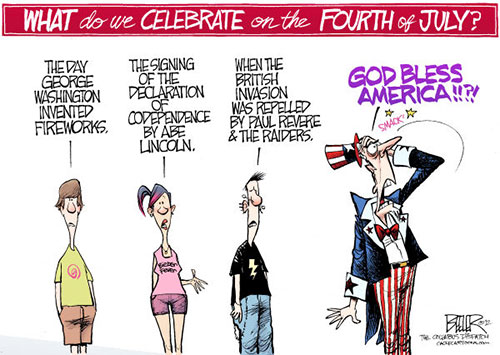
Fourth of July Fast FactsBy TOM PURCELLJuly 01, 2014
"Actually, according to ConstitutionFacts.com, that's not so. The Continental Congress declared independence from Great Britain on July 2, 1776." "Then why do we celebrate our independence on the Fourth every year? Is that when we started the American Revolution?" "That is a common misunderstanding, as well. The American Revolution began in April 1775, more than a year earlier." "I'm stumped. Was the Fourth the day Thomas Jefferson wrote the first draft of the Declaration of Independence?"
July Fourth
"He didn't? I always thought he was the sole author." "A common misconception. In fact, the Continental Congress appointed a five-person to write the Declaration. It included Jefferson, Benjamin Franklin, John Adams, Robert Livingston and Roger Sherman." "How about that." "Though Jefferson wrote the first draft, it was changed 86 times by other members of the committee and other members of the Continental Congress." "Interesting, but what the heck happened on July 4?" "That was the day that the Continental Congress, after two days of discussion and debate, agreed on the final wording of the Declaration of Independence." "And that was also the day members of the Continental Congress signed the document and sent it off to old Georgie?" "Actually, they didn't sign the Declaration until Aug. 2, 1776. Nonetheless, July 4, 1776, became the date that was included on the final handwritten draft, and that is the date people associate most with our independence." "Interesting stuff, but when did the Fourth of July become a national holiday?" "Well, for the first few decades after the Declaration was signed, our young nation didn't celebrate its independence on any date. Believe it or not, by the 1790s, the Declaration would become controversial, and some had no desire to celebrate it." "Two decades after it was signed, it became controversial?" "Bitter partisan conflicts existed then, as they do now. ConstitutionFacts.com says that the Democratic-Republicans, who admired Jefferson and the Declaration, argued with the other party, the Federalists, who thought the Declaration was too pro-French and too anti-British." "Our politicians haven't changed much, have they?" "In 1817, 41 years after the Declaration, John Adams complained that Americans were uninterested in their past. By the 1820s and 1830s, however, new parties rose to power that 'considered themselves inheritors of Jefferson and the Democratic-Republicans,' says ConstitutionFacts.com . They circulated copies of the Declaration, which featured July 4, 1776, as the day it was finalized." "The sound like modern-day tea partyers!" "Then something else happened that would further cement 'July 4' in the minds of many. Both Thomas Jefferson and John Adams would die on July 4, 1826, exactly 50 years after July 4, 1776." "That's some interesting stuff!" "In any event, over the years, Americans began celebrating America's independence on the Fourth. Finally, in 1870, almost 100 years after the Declaration was written, the Congress declared July 4 to be a national holiday." "Things sure do move slowly in Washington." "This Fourth of July will mark the 238th anniversary of the Declaration, a fascinating document that opened our country's doors to life, liberty and the pursuit of happiness — and tremendous opportunity for millions." "We surely have had a good run. I hope we can keep it going." "We can keep it going so long as all Americans understand the uniqueness of the American experiment and what makes it work. It all begins with our Declaration, which we can all learn more about."
©2014 Tom Purcell. Tom Purcell, author of "Misadventures of a 1970's Childhood" and "Comical Sense: A Lone Humorist Takes on a World Gone Nutty!" is a Pittsburgh Tribune-Review humor columnist and is nationally syndicated exclusively by Cagle Cartoons Inc. E-mail Tom at Purcell@caglecartoons.com Publish A Letter in SitNews Read Letters/Opinions
|
||
